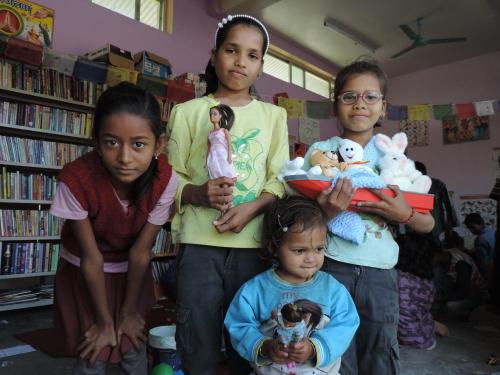
All children, no matter where they are born or whom their parents are deserve to be given an opportunity to develop themselves and have a happy life. However, this is hardly the case as I've found living in rural Nepal.
It is not uncommon for children to play with a ball made of rubber bands or a number of rocks, in which one rock is thrown in the air and other rocks snatched with the same hand. There is nothing wrong with this. However, why shouldn't these children, or for that matter any child, have access to the resources that are found in western countries to help them develop mentally, physically and emotionally.
Our library/resource centre recently received a large donation of books, toys, building blocks, creative materials from both the US and India. Although there have only been a few library sessions since receiving the donations, I can see the children using the toys like any child would, e.g. plates, tea cups, tea pot, dolls and then pretending to have tea. I assume that these children, although they might not have had the pretend tea set in their lives before, learned what to do through actual household work. The difference is that instead of serving others, they can serve their dolls or themselves in a fun environment.
As I've spent time in the homes of my younger "friends" I hardly ever see any toys. There are TVs which operate when the power is on, but no real toys, a doll, jump rope, stuffed animal, cars, games. When I visit schools I hardly eve see walls decorated with student art work, posters, and pictures. It's all very bland and not very stimulating. Yet, generally children do seem happy, although I've noticed a lot of emotional and behavioral issues which may never be resolved.
As a somewhat well adjusted adult I feel a sense of love and responsibility towards helping the children whom I come into contact with to having a different type of experience. I am not trained to resolve behavioral and emotional issues but maybe I can talk to parents about their children and what I observe, although this might be very sensitive as the parents have little frame of reference for, e.g. depression.
I know that in the US children have an abundance, even if someone is considered to come from a poor family, i.e. there is always a Christmas because of the good nature of others around the holidays. To see the children of Karjanha cram into our small library/resource centre space to play or to watch a movie is a huge present.
I've come to the conclusion that no matter what, as adults we have to care about our own and other children if the world is to change. It's not a matter of being a blood relative but it is a sense of responsibility which adults must take on no matter where a child comes from.
I've always been and continue to be a big fan of children, because many of them have not yet been jaded by life and seem to be open to possibilities. If all adults would try to look at children differently and feel a sense of responsibility towards their development the world might become a happier place and resources might be shared more equally. If somehow more adults can grow up then possibly children can be allowed just to be children.










Add new comment